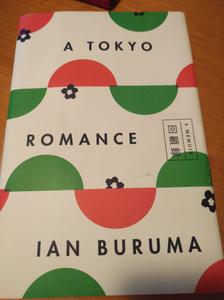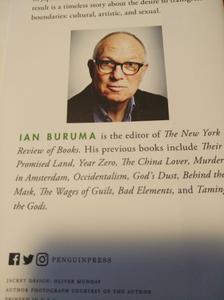Books - Read and Enjoyed
A Tokyo Romance
A memoire
Penguin Press, New York, 2018
by Ian Buruma
Ian Buruma, born in The Netherlands, studied Chinese and Japanese culture, lived in Japan from 1975 to 1981 and lives now as a writer in New York.

The book, published in 2018, is a reflection on the time 1975-81 when Ian Buruma lived in Tokyo, first as a student of Japanese cinema at the Nihon University and then working as a film reviewer, photographer and documentary filmmaker. On one hand it is a review of the cultural scene in Tokyo of the 1970s and in particular a detailed description of several performance and dance groups where Ian Buruma was a member.
Maro Akaji founded the Dairakudakan Temputenshiki, a Butoh dance group. Butoh is a style of performance or dance that puts the body in the center of expression. Butoh was developed in Japan after world war II, based on traditional Japanese dance styles and as a reaction against the Japanese dance scene then, which was seen as imitating the West.
In a similar tradition, Kara Juro was the founder of the Situation Theater and Ian Buruma became a member and actor in that group. The relations within the group were very tight, charatcerized by “wetness”:
The Japanese have an expression for human relations that are
sticky with the mutual obligations and dependencies of the
collective life. They use the English word "wet". Traditional
Japanese Family relations are "wet". Yakuza gangs are "wet".
Behavior that is more detached, more individualistic, often
associated with a Western way of life, is "dry". Terayama Suji
was "dry". Kara was most definitely "wet".
(Page 147)
Obviously, Ian Buruma enjoyed being part of this “wet” culture:
Despite the morbidity of their art, Maro and his troupe were
enormous fun to be with. We would talk through the night about
dance, culture, sex, and literature, while consuming huge amounts
of alcohol."
(Page 125)
The book dives into those very special sub-cultures of dance groups, film makers, photographers, tattoo makers, and other artists of Japan in the 1970s, just as Ian Buruma did when he moved to Tokyo after his studies of Chinese Literature in Leiden, eager to understand and immerse into that culture.

On the other hand, the book is also a constant reflection on what it is to be a Western foreigner in Japan, a “privileged gaijin”. Even though Ian Buruma obviously tried very hard to become Japanese, he eventually realized that a gajin always remains a gaijin not matter how well he or she speaks the native language. He notes, that the provileg of the gajin is real because it is easy to confuse rarity with being special, even superior, and it is perfectly possible to live a content live in Japan. But it seems to be impossible to fully erase the dividing lines.
For those reasons Iam Buruma leaves Japan to live in London, and later in New York, as writer, historian and editor. In 2017 he became editor if the New York Review of Books, which he left a year later amid a controversy about his decision to publish an essay by the Canadian talk show host Jian Ghomeshi, who was acquitted in 2016 of one count of choking and four counts of sexual assault, after over 20 women complained either to the police or in the media.
(AJ December 2020)
